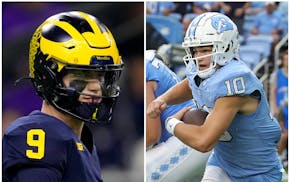J Robinson has never been bashful in his opinions, even at the expense of political correctness. The legendary Gophers wrestling coach loves to needle conventional thought, which is part of his charm.
One topic in particular gets him riled up: the changing landscape of college athletics.
College sports have become a lucrative enterprise. TV networks funnel obscene amounts of money to schools. Coaching salaries continue to soar. Apparel deals and facility upgrades fuel an arms race. The whole notion of amateurism feels archaic.
The five major conferences likely will adopt new legislation this year that gives athletes spending money in addition to their scholarships. Known as full cost of attendance, the payout is expected to range from $2,000 to $5,000 per year for each full-ride athlete, depending on the school.
I've advocated for this measure publicly because it's long overdue. A reasonable stipend for spending money seems fair in the context of this booming business.
Robinson strongly disagrees.
"How much is enough?" he replied. "That's the question that nobody wants to answer."
The rising cost of business is an important and complicated issue for anyone who cares about college sports. And there are no easy answers or solutions.
I tend to view this debate through a football-centric lens. Take care of the golden goose above all else because football drives the bus.
Robinson sits on the other side. He's incredibly smart and passionate and steadfast in his beliefs. I value his perspective. So I shared my viewpoint and then listened to his.
"What's going to happen is the dynamic of college athletics is just eating away at everything," he said.
Robinson called the current model "dysfunctional" and knocked the full-cost-of-attendance idea as more evidence that college athletics are spiraling out of control.
"At some point in time, you're going to run out of money," he said. "You can't in any business keep adding things to it and expect to continually grow and grow. At some point, it will stop. And then, in need for money, what's going to happen?"
Schools will be forced to eliminate some nonrevenue sports?
"That's right," Robinson said. "They're going to cut sports. Is this an educational-athletic experience, or is this an athletic-educational experience? Which is the most important? Because where you put it determines the importance of why these kids are here. Are they here to be pros? No, 95 percent of them aren't going to be in the pros. …
"We have lost sight of what the most important thing is. And we're trying to justify everything else because of it. I'm as driven as anybody to win. But the genie is out of the bottle, and the people in charge are afraid to put it [back] in. It's not going back in unless the presidents step in with a lot of moral courage."
I mentioned that football and basketball players deserve more benefits considering the value of those sports to a university in terms of money and visibility and the fact that everyone around them is getting richer.
"Where's our balance?" Robinson said. "We've lost it. And everybody is on the bandwagon. But when you look at the business model, it doesn't work. They're being compensated fairly for who they are and where they are in their life. …
"We all want more. But there comes a time when you say enough is enough. What football and basketball gets is enough."
Robinson knows the obvious comeback in this debate: Football and basketball pay the bills for everyone else. Without their financial streams, nonrevenue sports couldn't survive. That's a crucial part of this discussion.
"So is that the value of life, money?" he said. "Principles are more important than money."
The full-cost proposal could cost the Gophers an additional $500,000 per year, which is not a pittance for an athletic department already struggling to make budget. Robinson's wrestlers on partial scholarships would be eligible for a percentage of the full-cost money, which he described as "crumbs."
"You have to be able to look ahead when there's problems," he said. "We can either deal with it now or are we going to wait 10 more years until we've dropped all kinds of sports and we've gone to a semi-pro thing? Is that what we want?"
Robinson is correct that, on its face, it seems misguided that a football coach can make three or four times as much as his university president. But that toothpaste isn't going back in the tube.
"What did Martin Luther King say? It's always the right time to do the right thing," Robinson said.
At 68, Robinson knows he might not coach long enough to see where this path leads. He's concerned, though. And he's never been one to sit idle and say nothing.
"In the rush for money, we've just thrown away our principles, our values, who we are," he said. "That's all we're doing. It's sad."
Chip Scoggins • chip.scoggins@startribune.com
Scoggins: Why 'championship or bust' fits these Wolves

Scoggins: Anatomy of a game-saving play as Correa throws out Ohtani

Scoggins: McCarthy or Maye? Ex-U coach breaks down Vikings' options
Scoggins: Cory Provus getting ready for 'biggest challenge' of career

